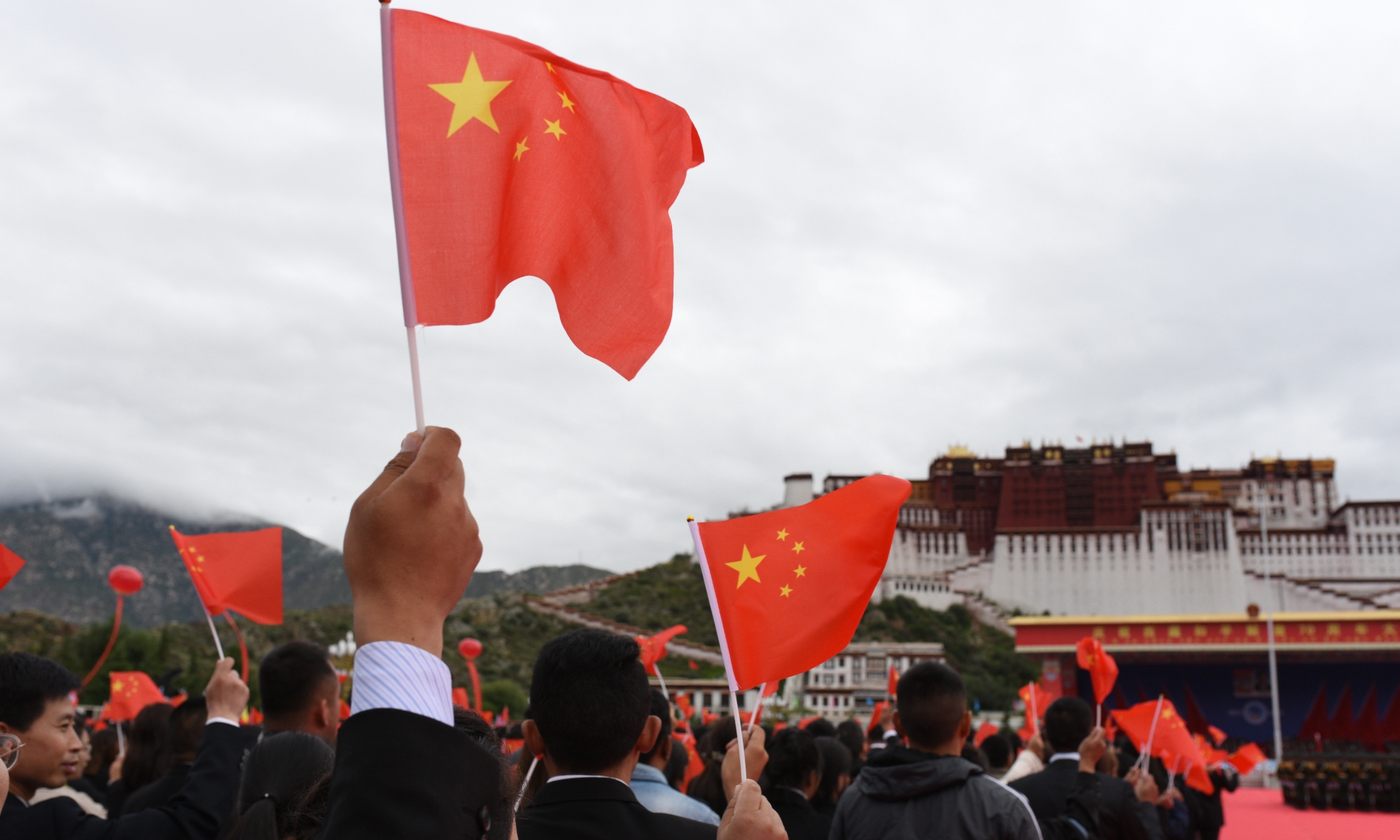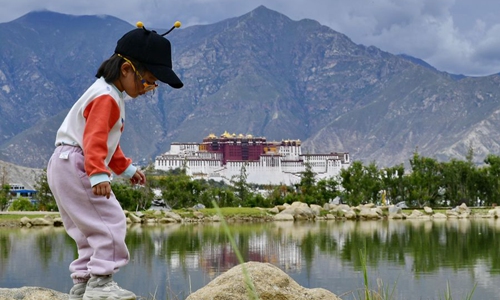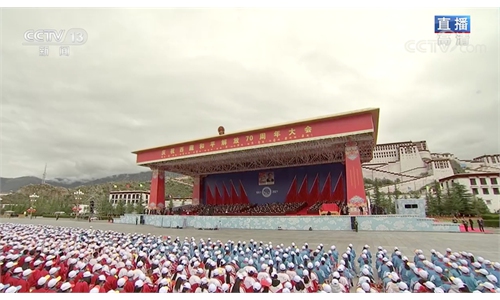Tibet celebrates 70th anniversary of peaceful liberation
CPC leadership key to development miracle in harsh high-plateau region

Photo: VCG
With a grand celebration held in front of Lhasa's Potala Palace in Southwest China's Tibet Autonomous Region, people on Thursday marked the 70th anniversary of the peaceful liberation of Tibet. After seven decades of miraculous progress in the high-plateau region, Tibet is now eyeing high-quality development, with border construction, ethnic unity and eco-environmental progress as focuses in its future plan.
China's top political advisor Wang Yang, who led a central government delegation to attend the event, called the peaceful liberation of Tibet in 1951 "a major victory in the cause of liberation of the Chinese people and China's reunification," saying it marked a historic transition with epoch-making significance for Tibet.
"Since then, Tibet has embarked on a path from darkness to brightness, from backwardness to progress, from poverty to prosperity, from autocracy to democracy, and from being closed to being open," said Wang, chairman of the National Committee of the Chinese People's Political Consultative Conference (CPPCC).
The GDP in Tibet soared past 190 billion yuan (about $29.3 billion) in 2020 from a mere 130 million yuan in 1951, Wang noted.
"It has been proven that without the CPC, there would not be a new Tibet," Wu Yingjie, secretary of the Tibet Autonomous Regional Committee of the Communist Party of China, said at the meeting.
The government led by the CPC cares for the well-being of the people in Tibet and is able to concentrate resources on large undertakings, ensuring the implementation of key projects in a region with such difficult natural conditions, Xiao Jie, a deputy director at the Institute for Contemporary Tibetan Studies under the China Tibetology Research Center, told the Global Times on Thursday.
Infrastructure construction in Tibet, including the Qinghai-Tibet railway, the Lhasa-Nyingchi railway and a number of hydropower stations, have enabled the region to utilize resources from domestic or international markets from a relatively high level, Xiao said.
Moreover, Tibet has successfully chosen industries that suit its conditions, such as tourism and modern agriculture, Xiao noted.
Tens of thousands of people participated in the Thursday event, including representatives of local residents, students, military and police officers.
The 11th Panchen Lama also attended the event.
Celebrations had been held all around the autonomous region. On Thursday, the Tibet Daily used 60 pages to look back at the history of Tibet being a part of China, the journey of Tibet's development and the prosperity around the region.
In only seven decades, Tibet has realized a historic leap of thousands of years - transforming itself from a feudal serfdom to a socialist system; from poverty and backwardness to civilization and progress, the newspaper read.
In July, Chinese President Xi Jinping visited the Tibet Autonomous Region for the 70th anniversary of Tibet's peaceful liberation.
"It has been proven that without the CPC, there would have been neither new China nor new Tibet," Xi said. "The CPC Central Committee's guidelines and policies concerning Tibet work are completely correct."
Xi also stressed writing a new chapter of lasting stability and high-quality development for the plateau region.
Since the 18th National Congress of the CPC held in 2012, stability, development, eco-environmental progress and border-area consolidation have become the four major issues in Tibet.
With its peaceful liberation in 1951, the people of Tibet broke free from the fetters of invading imperialism for good, and embarked on a bright road of ethnic unity, progress and development, according to the Xinhua News Agency.
A better life
In the past 70 years, especially in recent decades, local people's lives across Tibet, whether in major cities like Lhasa and Shigatse or border regions in Ngari prefecture and some border counties like Yadong, have seen remarkable improvements.
Drolma Tasering, 70, a villager in Yadong county, a frontier county and trade market bordering India and Bhutan, said the people there have a very strong sense of gratitude toward the CPC and the People's Liberation Army (PLA). He noted that outsiders with a bias against Tibet would not understand because they haven't "experienced what we have in the past 70 years."
Drolma is a survivor of the earthquake on September 18, 2011 in Yadong. Villagers initially saved her when she was buried under debris. When the rescue team made up of firefighters and PLA troops arrived, more and more people were rescued and received food, tents and other materials. Now she lives in a new two-storey house.
Asang, 40, the son of Drolma, told the Global Times that "the houses for local villagers - most of which are two-storey, some are one-storey - were built by the local government after the earthquake, and they are much more modern and comfortable than the old ones we used to live in. We only had to spend 50,000 yuan to buy it, and if you just want the one-storey one, the house is free."
Local villagers will also receive about 10,000 yuan every year in subsidies for protecting forests and patrolling the border, and monthly living expenses for ordinary villagers like Drolma come to just a few hundred yuan, so the people there feel almost no life pressure, Asang said.
By the end of 2019, all registered poor residents in Tibet had shaken off poverty, marking the elimination of absolute poverty in the region for the first time in history, according to Xinhua.
The average annual per capita disposable income of those who have got rid of poverty in Tibet exceeds 10,000 yuan ($1542), according to a white paper issued in May by China's State Council Information Office.

A child plays by a lake at Nanshan Park in Lhasa, southwest China's Tibet Autonomous Region, July 30, 2019.(Xinhua/Zhang Rufeng)
Border reinforcement
Due to the ups and downs in its relations with India, China has included border-area consolidation in the main focuses of Tibet's development and has seen the policy bear fruit in the past years.
Wu, the regional Party secretary, said at the Thursday event that the population of the border regions in Tibet has increased by 10.5 percent.
According to Wu, financial support to the border regions have been enhanced, subsidies to border residents have been "greatly increased," and 21 border counties in Tibet are all receiving aid from the central and national-level governmental departments.
Since around 2017, China started to relocate some residents living in harsh conditions in Tibet to the nearby border regions and built infrastructure there, an observer told the Global Times.
Doklam, where China and India had an intense military standoff in 2017, is located in the south of Yadong. Local people and officials told the Global Times that at the time, local governments transferred people to places away from the border regions, as the possibility of military conflict was high.
However, many local villagers refused to leave at the beginning because they wanted to stay and help the PLA, as locals saw the PLA troops as their "saviors and protectors," If the border conflict with India escalated, many locals would have voluntarily brought food and even their own farm cattle to the PLA, said local villagers and some local officials who requested anonymity.
Fortunately, the standoff ended peacefully, but many locals and officials told the Global Times that this kind of close bond between the PLA and local civilians in border regions is a source of strength for China in defending its sovereignty and fighting foreign enemies, giving them strong confidence to overcome various challenges.
Against secession
The 70 years since liberation in Tibet is also a history of constant battling with secession initiated by the 14th Dalai Lama clique and the Western forces behind them.
"No one has the right to point fingers at China when it comes to the Tibet-related affairs," Wang Yang said at the Thursday meeting. "Any attempt or maneuver designed to separate Tibet from China is doomed to fail," he emphasized.
"It should be made clear the nature of the Dalai clique in agitating for 'Tibet independence'," Zhu Weiqun, former head of the Ethnic and Religious Affairs Committee of the National Committee of the CPPCC, told the Global Times in a previous interview.
"His so-called middle way approach is to realize a Tibetan 'high degree of autonomy', and then independence," Zhu said.
After the failure of their armed rebellion in 1959, the reactionaries of Tibet's ruling class fled to India and subsequently began to campaign for "Tibetan independence."
Since the 1980s, Western forces have played an active role in the outbreaks of unrest that have taken place in Tibet. The region has become a card for the West to play in an attempt to contain China.
In past years, the Dalai clique and some Western countries have hyped up issues including the "Independence of Tibet" and the reincarnation of the Dalai Lama. For instance, since 2011, the Dalai clique has instigated young lamas in China to carry out self-immolation.
Recently, interactions between the Dalai clique, the US and India have even been increasing in frequency. In July, US Secretary of State Antony Blinken met a representative of the Dalai Lama in New Delhi and Indian President Narendra Modi phoned the Dalai Lama on his birthday, media reported.
Zhao Lijian, Chinese Foreign Ministry spokesperson, said at a press conference on July 29 that "the 14th Dalai Lama is by no means just a religious figure, but rather a political exile who has long been engaging in anti-China separatist activities and attempting to split Tibet from China. China firmly opposes any form of contact between foreign officials and the Dalai Lama."
The grand ceremony has clearly shown that people in Tibet now live moderately prosperous lives under the leadership of the CPC, which is the best rejection of the charges from the West and the Dalai clique, Xiao said.



